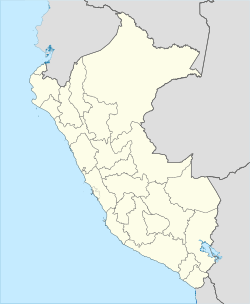Rioja, Peru facts for kids
Quick facts for kids
Rioja
|
|
|---|---|
|
Town
|
|
| Country | |
| Region | San Martín |
| Province | Rioja |
| District | Rioja District |
| Elevation | 848 m (2,782 ft) |
| Population | |
| • Estimate
(2015)
|
22,197 |
| Demonym(s) | Riojano/a |
| Website | www.rioja.com.pe |
Rioja is an important town in northern Peru. It is the capital city of the Rioja Province. You can find it in the San Martín Region. Rioja is located west of another city called Moyobamba. In 2015, about 22,197 people lived there.
The town is quite high up, about 848 meters (2,782 feet) above sea level. Rioja has a climate that is somewhat humid and warm.
Contents
History of Rioja
Early Inhabitants
Long ago, during the time of the Incas, two main groups of people lived in the area around Rioja. These groups were known as the Uquihuas and the Chepenes tribes. They were the first known inhabitants of the Rioja Province.
Founding of the Town
Towards the end of the 16th century, some of the first Catholic missionaries arrived in the region. One of them reached the area where the Uquihuas lived. Rioja was officially founded much later, in September 1782. It was first given a longer name: Santo Toribio de la Nueva Rioja.
Geography and Climate
Where is Rioja?
Rioja is located in a valley. This valley is formed by the upper part of the Mayo River. It's in the northern part of the San Martín Region. The exact location of Rioja is at longitude 77°08’30” West and latitude 06º03’00” South.
Surrounding Landscape
The town of Rioja is surrounded by tall peaks. These mountains rise to more than 1,000 meters (3,280 feet) above sea level. This makes for some very beautiful scenery around the town.
Weather in Rioja
The average temperature in Rioja is around 22.5 degrees Celsius (72.5 degrees Fahrenheit). However, the temperature can change throughout the year. It usually stays between 16.5 degrees Celsius (61.7 degrees Fahrenheit) and 28.4 degrees Celsius (83.1 degrees Fahrenheit).
| Climate data for Rioja, elevation 823 m (2,700 ft), (1991–2020) | |||||||||||||
|---|---|---|---|---|---|---|---|---|---|---|---|---|---|
| Month | Jan | Feb | Mar | Apr | May | Jun | Jul | Aug | Sep | Oct | Nov | Dec | Year |
| Mean daily maximum °C (°F) | 28.2 (82.8) |
28.0 (82.4) |
28.2 (82.8) |
28.5 (83.3) |
28.7 (83.7) |
28.5 (83.3) |
28.6 (83.5) |
29.2 (84.6) |
29.5 (85.1) |
29.4 (84.9) |
29.2 (84.6) |
28.6 (83.5) |
28.7 (83.7) |
| Mean daily minimum °C (°F) | 18.8 (65.8) |
18.9 (66.0) |
18.9 (66.0) |
18.9 (66.0) |
18.6 (65.5) |
17.7 (63.9) |
16.9 (62.4) |
16.9 (62.4) |
17.5 (63.5) |
18.6 (65.5) |
19.0 (66.2) |
19.1 (66.4) |
18.3 (65.0) |
| Average precipitation mm (inches) | 128.5 (5.06) |
169.6 (6.68) |
188.6 (7.43) |
150.5 (5.93) |
118.5 (4.67) |
56.3 (2.22) |
56.6 (2.23) |
70.3 (2.77) |
91.5 (3.60) |
150.2 (5.91) |
141.8 (5.58) |
143.1 (5.63) |
1,465.5 (57.71) |
| Source: National Meteorology and Hydrology Service of Peru | |||||||||||||
Getting Around Rioja
Rioja is well-connected to the rest of Peru. People can travel to and from the town by land, air, and even by river.
Land Travel
The main highway that goes through the jungle, called the "Carretera Marginal," connects Rioja to other parts of the country. You can find daily bus services here. There are also smaller vehicles like minibuses, shared collective taxis, and lorries (trucks) for transport.
Air Travel
Rioja has its own airport, called the Rioja Airport. This airport can handle small and medium-sized airplanes. It is used for both passengers and for carrying goods.
River Travel
For smaller cargo, people use the local rivers. Motor boats, canoes, and rafts travel along the Mayo, Tonchima, and Negro rivers. This is a traditional way to move goods in the region.
See also
 In Spanish: Rioja (Perú) para niños
In Spanish: Rioja (Perú) para niños
 | Shirley Ann Jackson |
 | Garett Morgan |
 | J. Ernest Wilkins Jr. |
 | Elijah McCoy |


